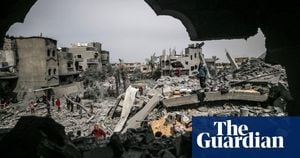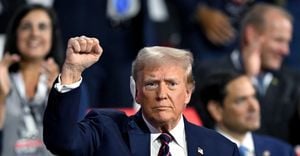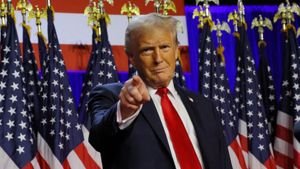With Donald Trump poised to reclaim the presidency of the United States, the political scene is abuzz with speculation about the future of U.S.-Israel relations. Trump, who famously labeled himself as the ‘dealmaker,’ hints at possibly steering Israel's strategic path during his second term. Will this dynamic change the geopolitical equation, especially concerning Arab nations and their stance on peace with Israel?
The time between Trump’s election and his inauguration, set for January 20, 2025, signals opportunities for Israel, traditionally recognized as America's ally. The current Israeli ambassador to the U.S., Michael Herzog, is expected to finish his notable three-year term right before Trump resumes his position, potentially making way for new diplomatic approaches.
Israeli Prime Minister Benjamin Netanyahu is reportedly ready to select Herzog's successor, who would be the point of contact for bolstering affairs between the two nations. Among contenders is Ron Dermer, Netanyahu’s longtime confidant and former U.S. ambassador from 2013 to 2021, known for his pivotal role during the negotiations of the Abraham Accords, which established peace agreements between Israel and several Arab nations.
Dermer’s deep grasp of American culture and politics might be exactly what Netanyahu desires, providing continuity to the already-established amicable ties. But sources suggest Dermer, who has raised his family primarily within Israel, finds it challenging to commit to the post once more.
The other notable candidate is Dr. Ophir Falk, who serves as Netanyahu’s foreign policy advisor and has extensive experience with international relations and counter-terrorism. Given his close rapport with Netanyahu and significant background, his appointment could signal Israel’s intent to maintain solid ties during turbulent global times.
Both possibilities reflect Israel’s larger ambitions for stability and security, especially as regional dynamics shift. Trump's anticipated tenure may oversee reinvigorated dialogues involving lesser-known assurance measures and strategies focused on Israel as the cornerstone of American foreign policy.
For many, Trump’s return also ignites hopes of revitalizing the Abraham Accords, which were landmark agreements forged during his first administration and aimed at normalizing relations between Israel and several Arab states, including Bahrain and the UAE. Analysts assert Saudi Arabia stands as the main target for expansion concerning normalization with Israel. Yet, any promises would likely come under the condition of resolving Palestinian statehood issues, as Saudi Arabia knows it needs to balance diplomatic power dynamics.
While major strides for peace seem on the horizon, challenges loom large. The conflict ignited by Hamas attacks on October 7, 2023, has complicated the circumstances surrounding peace negotiations. With the recent tragic loss of lives from Israeli military actions within Gaza and Lebanon, sentiments may sway perceptions of U.S. involvement. Observers note fluctuated enthusiasm among Gulf nations led primarily by the past administration’s perceived indifference to civilian deaths.
Critics suggest public support for Trump's policies may have cooled due to the current bloodshed. Many Gulf Arabs appreciated Trump's willingness to maintain strong diplomacy but have grown wary as violence escalated recently. Could his return to power sway these nations to restore confidence, or will it serve as the linchpin to escalate tensions?
Experts assert Trump’s unique approach to foreign policy emphasizes strength and sporadic alliances but balancing delicate negotiations with Iran may prove challenging. Washington's historical adversarial relationship with Iranian leaders complicates his engagement strategies, especially with their support for groups like Hezbollah and Hamas, which pose threats to Israel.
On the other hand, Trump's anticipated tactics include leveraging energy exports from Israel as strategic assets to navigate international relations positively. More dialogue concerning potential oil and gas exports from Israel, particularly to Egypt and Jordan, emphasizes growing economic ties. These links may provide diplomatic leverage amid letting Israel project security across the region.
Equally pressing is how Trump would handle relations with Russia amid its interventionist policies. Although Trump previously sought warmer ties with Russia under Putin, Israel's national interests dictate cautious approaches to be maintained. Fear of fostering greater instability as Russia partners with Iran remains one significant issue needing careful navigation.
Political observers also note Turkey's shifting stance within this complex web of alliances. Traditionally sympathetic toward Gaza, Turkey's governing party finds itself at odds with regional and NATO allies and has been pushed to reassess its hardline positions, implying possible room for American-led dialogues.
It remains unclear what Trump's policy will mean for the Syrian fronts of conflict, but expectations run high for potential transitions to revised stances on existing peace accords. With public sentiment across regions seeming fragmented, U.S. and Israeli leadership will need to reassess their current strategies if they transcend customary diplomatic maneuvers.
Supporters of Trump's presidency see boldness as necessary for Israel’s security and overall peace. Diversifying energy dependencies away from adversaries may provide mutual benefits for Israeli and Arab states wishing for economic stability not overshadowed by conflict.
While excitement presides over potential new agreements and partnerships, concern exists over how these changes might affect existing treaties. Trump’s predilection for direct involvement may warm Israeli hearts, yet the challenge of aligning Russia's interests complicates such desires.
Prominent power players, including Saudi Arabia and Egypt, have already cautiously observed Trump’s moves. Political analysts maintain cautious optimism they'll seize the moment, waiting to see if he achieves his vision of peace for Israel and its neighboring states.
Much hinges on Trump’s performance upon returning to the Oval Office; achieving sustainable peace within the region requires astute finesse and may prove to be his most significant test.
What lies beyond January 2025 may reshape the Middle East, but only time will reveal the consequences of the anticipated shifts and outcomes to come.



